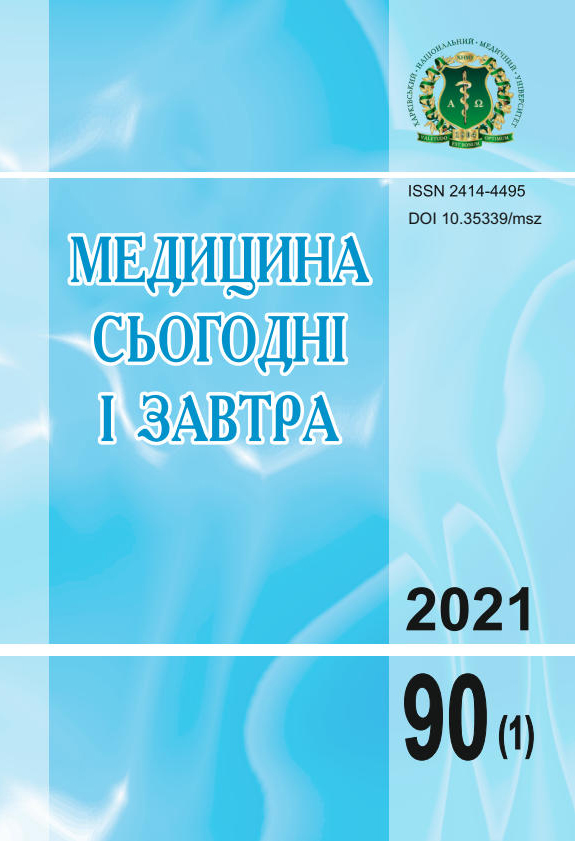Анотація
In press
Проведено комплексне клініко-психопатологічне та психодіагностичне обстеження 109 хворих на цукровий діабет ІІ типу обох статей у віці (35,9±10,1) року, котрі мали емоційні розлади. Основну групу становили 65 хворих, які окрім стандартного лікування за клінічними протоколами отримували курс біосугестивної терапії; контрольну – 44 хворі, які отримували стандартну терапію за клінічними протоколами. Використання біосугестивної терапії у комплексному лікуванні пацієнтів емоційних розладів у хворих на цукровий діабет ІІ типу надає позитивний вплив на відчуття психологічного благополуччя, поліпшення міжособистісних відносин, посилення почуття причетності і особистісної реалізованості, що зі свого боку відбивається на загальному сприйнятті якості життя, а головне – знижуються основна симптоматика і рівень нервово-психічного напруження. Доведено високу ефективність використання біосугестивної терапії в комплексному лікуванні емоційних розладів у хворих на цукровий діабет ІІ типу, а саме: відмічається зниження тривожнодепресивної симптоматики, відновлення працездатності та соціальної активності, зниження рівня нервово-психічного напруження, нормалізація циклу сон–неспання, покращання якості життя обстежених.
Ключові слова: цукровий діабет ІІ типу, емоційні порушення, корекція, психотерапія.
Посилання
Voloshyn, P. V., & Maruta, N. O. (2015). Stratehiia okhorony psykhichnoho zdo-rovia naselennia Ukrainy: suchasni mozhlyvosti ta pereshkody [The Strategy of Mental Health Care of the population of Ukraine: contemporary opportunities and obstacles]. Ukrainskyi visnyk psykhonevrolohii – Ukrainian Bulletin of Psychoneurology, 23(1(82)), 5–11. Retrieved from: https://is.gd/fiP2Sv [in Ukrainian].
Mokrii, V. Ya., Ziablitsev, S. V., & Kryshtal M. V. (2016). Osoblyvosti formuvannia okysnoho stresu u khvorykh na tsukrovyi diabet 2-ho typu zalezhno vid tryvalosti zakhvori-uvannia ta stati [Features of oxidative stress formation in patients with type 2 diabetes melli-tus depending on the disease duration and gender]. Mezhdunarodnyi endokrinolohichesknii zhurnal – International Journal of Endocrinology, (5(77)), 67–71. DOI: 10.22141/2224-0721.5.77.2016.78757 [in Ukrainian].
Radchenko, O. M., Hryshchenko, S. V., Dzhon, Dzh. F., Andreichyn, V. A., Kle-pach, M. S., & Skrobach, N. V. (2003). Osoblyvosti perebihu tsukrovoho diabetu pry riznykh typakh zahalnykh nespetsyfichnykh adaptatsiinykh reaktsii [Features of the course of diabetes mellitus in different types of general nonspecific adaptive reactions]. Halytskyi likarskyi visnyk – Galician Medical Journal, (3), 68–71 [in Ukrainian].
Kozhyna, H. M., Hryhorova, I. A., Korostii, V. I., et al. (2011). Kohnityvni ta emotsiini porushennia vnaslidok somatychnykh zakhvoriuvan u osib pratsezdatnoho viku [Cognitive and emotional disorders due to somatic diseases in people of working age]. Kharkiv: Hlobus [in Ukrainian].
Korostii, V. I. (2009). Mesto psikhoterapii v kompleksnom lechenii nepsikhotich-eskikh psikhicheskikh rasstroistv u bolnykh s psikhosomaticheskimi zabolevaniiami [The place of psychotherapy in the complex treatment of non-psychotic mental disorders in patients with psychosomatic diseases]. Medychna psykholohiia – Medical Psychology, 4(2–3(14–15)), 139–140 [in Russian].
Shevchuk, M. V., Tsyhanenko, O.O., Taranenko, O.V., Kryzhevskyi, V. V., & Mankovskyi, B. M. (2019). Praktychne znachennia diahnostyky depresii u patsiientiv iz tsu-krovym diabetom 2-ho typu [Practical significance of diagnostics of depression in patients with type 2 diabetes mellitus]. Mizhnarodnyi endokrynolohichnyi zhurnal – International Jour-nal of Endocrinology, 15(1), 50–54. DOI: 10.22141/2224-0721.15.1.2019.158695 [in Ukraini-an].
Chuhunov, V. V., Markova, M. V., Kurylo, V. O., Tkachenko, O. V., Danilevska, N. V., Gaponov, K. D. et al. (2020). Osoblyvosti struktury ta rozpovsiudzhenosti astenii v strukturi tsukrovoho diabetu 2-ho typu sered khvorykh riznykh sotsialnykh hrup [Pe-culiarities of the structure and distribution of weakness in the structure of type 2 diabetes mellitus among different social groups]. Problemy endokrynnoi patolohii – Problems of Endo-crine Pathology, (2 (72)), 89–94. DOI: 10.21856/j-PEP.2020.2.11 [in Ukrainian].
Zherdova, N. M. (2016). Stan kohnityvnoi funktsii ta depresyvnykh rozladiv u khvorykh na tsukrovyi diabet 2-ho typu zriloho viku zalezhno vid vydu tsukroznyzhuvalnoi terapii [Status of cognitive function and depressive disorders in patients with type 2 diabetes in adulthood, depending on hypoglycemic therapy]. Endokrynologia – Endocrinology, 21(4), 350–355. Retrieved from: https://endokrynologia.com.ua/index.php/journal/article/view/185 [in Ukrainian].
Strazhnyi, O. (2020). Biosuhestyvna terapiia dlia korektsii i likuvannia psykhoso-matychnykh rozladiv: Praktychnyi posibnyk [Biosugestive therapy for the correction and treat-ment of psychosomatic disorders: Practical guide]. Kyiv (132 p.). [in Ukrainian].
Strazhnyi, A. (2019). Nevrozy, v kotoryie ihraiut liudi [The neuroses that people play]. Kharkov (289 p.). [in Russian].

